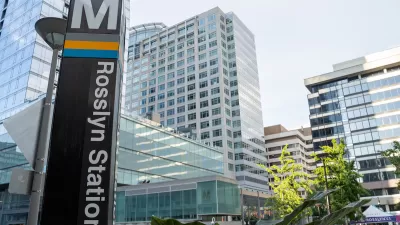Generally speaking, elected officials don't campaign for higher fees. However, in this op-ed, D.C. Councilman Tommy Wells draws a connections between higher residential parking fees, improved public transit, and better access to street paking.
Wells acknowledges the shortage of on-street parking spaces in many neighborhoods: "In many neighborhoods, there is not enough parking for every household to use even one space on the street." He proposes higher fees as a win-win strategy for dealing with the shortage.
"D.C. residential parking permits generally cost $15 each for an unlimited number of vehicles, and the mayor's budget would increase that to $25. My proposal would charge each household $35 for a first sticker...., charge an only slightly higher fee of $50 for the second," and costs would then double to $100 for additional ones.
Councilman Wells proposes to direct the increased revenue to public transit, more traffic control officers, and other improvements. He explains how the higher fee would discourage households with multiple vehicles to cut back or find alternative parking places.
"Without this parking fee increase, the mayor's proposed budget would require service cuts at Washington Metropolitan Area Transit Authority. That means the 37 percent of D.C. households that do not own a car and probably depend on Metro for their basic transportation would lose a city service, while those who own cars would continue receiving a tangible city benefit for only a nominal fee."
Thanks to Ann Mesnikoff
FULL STORY: Opinions: Raising parking fees is a win-win for D.C.

Planetizen Federal Action Tracker
A weekly monitor of how Trump’s orders and actions are impacting planners and planning in America.

Restaurant Patios Were a Pandemic Win — Why Were They so Hard to Keep?
Social distancing requirements and changes in travel patterns prompted cities to pilot new uses for street and sidewalk space. Then it got complicated.

Maui's Vacation Rental Debate Turns Ugly
Verbal attacks, misinformation campaigns and fistfights plague a high-stakes debate to convert thousands of vacation rentals into long-term housing.

Boulder Eliminates Parking Minimums Citywide
Officials estimate the cost of building a single underground parking space at up to $100,000.

Orange County, Florida Adopts Largest US “Sprawl Repair” Code
The ‘Orange Code’ seeks to rectify decades of sprawl-inducing, car-oriented development.

Maui's Vacation Rental Debate Turns Ugly
Verbal attacks, misinformation campaigns and fistfights plague a high-stakes debate to convert thousands of vacation rentals into long-term housing.
Urban Design for Planners 1: Software Tools
This six-course series explores essential urban design concepts using open source software and equips planners with the tools they need to participate fully in the urban design process.
Planning for Universal Design
Learn the tools for implementing Universal Design in planning regulations.
Heyer Gruel & Associates PA
JM Goldson LLC
Custer County Colorado
City of Camden Redevelopment Agency
City of Astoria
Transportation Research & Education Center (TREC) at Portland State University
Camden Redevelopment Agency
City of Claremont
Municipality of Princeton (NJ)





























